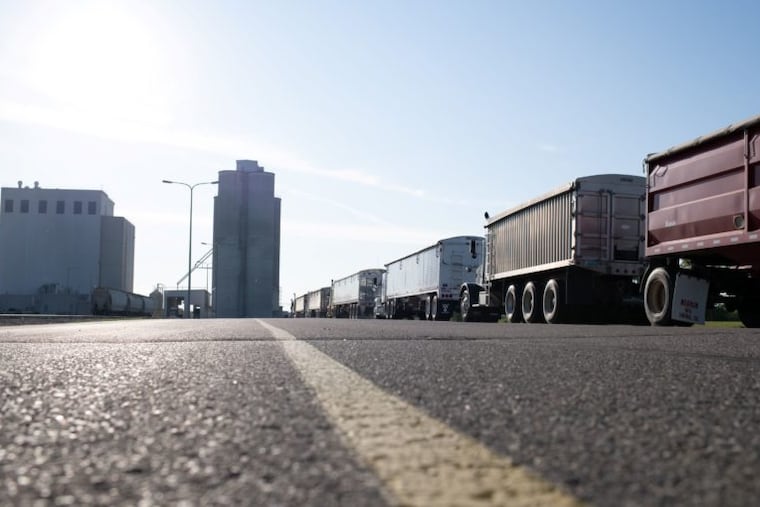Philadelphia Macaroni Co. buys New York’s Zerega, combining two venerable names in Italian American pasta
Buying Zerega’s makes Philadelphia Macaroni the nation’s largest privately-owned pasta maker, a company executive said.

They haven’t shut factories or laid off workers -- to the contrary, they’re extra busy -- but the coronavirus has left a deep mark at Philadelphia Macaroni Co., the family-owned Bella Vista-based business that doubled in size this week to 700 million pounds a year after buying rival A. Zerega’s Sons of New York.
“Oh my God, we’re going 24/7. We’re putting up ‘Help Wanted’ billboards out West," says Linda Schalles, special-projects director for the company, which employs more than 400 at offices on South 11th Street, and factories in Warminster and Harrisburg, Pa.; Minot, N.D.; Grand Forks, N.D.; and Spokane, Wash. "And we’ve been on it, with masks and washing, from the very beginning. This has to be a very clean business.”
“COVID-19 turned my world upside down,” added executive chairman Luke Marano Jr., whose great-grandfather founded the company in 1914.
His equipment dealer in Italy had warned him to brace for a surge in sales as Americans were ordered to stay home. “Our customers all got run over with demand," Marano said. “People cleared out the grocery stores and that cleared out the warehouses. We were running at 80% [capacity], now we’re at 105%” and starting to miss the normal pace.
Then he got the virus. “I got fevers, I threw up for a day, and then I was fine," he said.
“Then my father got it.”
Luke Marano Sr. died at age 94 on April 21. The father of seven, grandfather of 15, and great-grandfather of 22 had pioneered the noodle O cut from penne, among many other innovations.
“He was great," his son said. "He took me into the factory here when I was 7. He gave me a broom and made me sweep.”
Luke Jr. later worked for Frito-Lay and Nabisco before his father invited him back. Time outside is now a requirement for family members who hope to advance. The factory he swept is now the company’s offices.
Buying Zerega’s makes Philadelphia Macaroni the nation’s largest privately owned pasta maker, according to chief executive Ed Irion.
Customers include General Mills, ConAgra Brands, Unilever, and Campbell Soup. Products include instant ramen and the macaroni in mac-and-cheese boxes, besides the familiar Italian dry and stuffed frozen varieties, sold under many brand names.
Food-service sales fell at the outset of the pandemic, as restaurants and colleges closed. But Marano said the jump in grocery purchases has more than made up the gap.
The two families had a virtual sit-down and conference call Friday morning to get better acquainted. “We had 165 people,” Schalles said. “The senior people have known each other for decades. They were saying it’s great to finally be part of the same company. Their grandfathers knew each other. It’s a very small and close community.”
The combined business can diversify “and compete against larger players,” especially in food service, Marano said.
Philadelphia Macaroni’s Western factories, financed with help from the state-owned Bank of North Dakota, which lends heavily to that state’s farmers, sit squarely in North America’s prime durum wheat growing country, home to the hard winter grain that makes what fans call the best semolina flour for pasta.
Zerega’s, whose founder, Antoine Zerega, built the pioneering U.S. pasta factory in Brooklyn in 1848, includes plants in Fair Lawn, N.J., and Lee’s Summit, Mo., and will keep running them as a Philadelphia Macaroni subsidiary.
Ex-treasurer freed
Joining former Philadelphia District Attorney Seth Williams among those released from U.S. prisons is Rob McCord, Pennsylvania’s former state treasurer who went to prison for trying to extort a campaign donor and would-be pension investor.
A close friend of McCord’s said the one-time venture capitalist was released from the federal prison in Edgefield, S.C., to home confinement at a residence nearby under terms of the First Step Act, which eases terms for first-time, low-risk offenders ages 60 and older.
He would have been out by July anyway, two-thirds into his sentence.
McCord expects to be what prison people call “off paper" — done probation — by March 2021. He has said he has no immediate plans to return to Pennsylvania.
Continuity roll-up
Business-continuity software maker Assurance Software Inc., of Audubon, has agreed to buy rival Avalution Consulting, of Cleveland, for an undisclosed price, the latest move in a consolidating industry.
Both firms had expanded through acquisitions last year. Assurance’s expansion is financed with help from investor Resurgens Technology Partners, of Atlanta.
Assurance employed 106 before the deal, almost half in the Philadelphia area. Chief executive Jon Ezrine didn’t disclose the price.
Cloud profit
Philadelphia’s growing tech investment firm MissionOG has turned a profit from the $145 million sale of DivvyCloud, an Arlington, Va.-based cloud-computing services firm.
MissionOG invested something under $5 million for a stake of up to 20% in DivvyCloud in 2017 and 2019. The sale marks MissionOG’s second successful cloud-computing exit, after the 2017 sale of Philadelphia-based Cloudamize to a company controlled by Blackstone Group, according to MissionOG managing partner George Krautzel.
An earlier version of this column gave an incorrect value for the annual production of the Philadephia Macaroni Co. since its combination with the Zerega company. It is 700 million pounds. The company doesn’t publicly report its revenues in dollars.